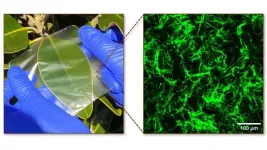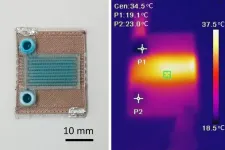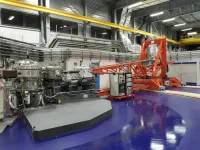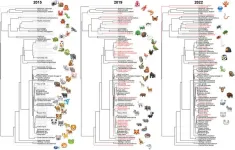(Press-News.org) Cola. A drink forever associated with the Christmas season. And also, for many, a liquid that can help clear a blocked oesophagus. Something that may be a bit more likely at this time of year. However, research from Amsterdam UMC, published today in the BMJ Christmas Issue, shows that this is not worth wasting the sugary stuff.
"Emergency physician Elise Tiebie, the driving force behind this project, saw online that this was really a rumour, from tip websites to Wikipedia as well as an anecdote in a British newspaper about paramedics saving a life by using cola. I've even heard doctors recommending it,” says Arjan Bredenoord, Professor of Gastroenterology at Amsterdam UMC and lead author of the study.
Sometimes a piece of food can get stuck in the oesophagus after swallowing, causing a painful feeling of pressure and sometimes people can no longer even swallow saliva. Usually, food gets stuck due to a narrowing of the oesophagus, which can be a scar from previous inflammation or from a narrowing by a tumour.
"This can be really dangerous, so it's important that people get the correct treatment. That's why we wanted to check if this works,” adds Bredenoord.
Sometimes the stuck piece of food comes loose on its own and sometimes it doesn't. Patients then have to resort to a trip to the emergency room. If there is a suspicion that the food chunk is still in the oesophagus, an emergency endoscopy will follow; A camera is inserted through the mouth into the oesophagus and the piece of food is then removed with a net or a forceps.
In the past, it has been suggested that cola could also help loosen the stuck food and prevent emergency endoscopy. Bredenoord and his team spread across five Dutch hospitals, investigated the usefulness and safety of cola when it comes to dissolving pieces of food stuck in the oesophagus.
51 patients participated in the study, while waiting for the endoscopy, half were given sips of cola in the emergency room, the other half just waited. If the patients still couldn't swallow saliva, an emergency endoscopy was indeed carried out and the piece of food was removed.
The results show that cola did not help, both in the patients who received cola and in those who waited without cola there was an improvement in 61% of patients. There were no side effects or complications of cola use.
"There was no improvement when using cola to loosen stuck food in the oesophagus, often the food dislodged on its own after a while and otherwise, we performed an endoscopy. Hopefully this put this myth to rest,” concludes Bredenoord.
END
If a piece of Turkey gets stuck in your throat this Christmas, there is no point in trying to free it with Cola
Amsterdam UMC research shows that cola can't help with a blocked oesophagus
2023-12-11
ELSE PRESS RELEASES FROM THIS DATE:
McGovern Medical School names new neurosurgery chair; Tandon takes on role at UTHealth Houston Neurosciences
2023-12-11
Jacques Morcos, MD, a renowned neurosurgeon from University of Miami Health System, will join UTHealth Houston as the new chair of the Vivian L. Smith Department of Neurosurgery with McGovern Medical School at UTHealth Houston, effective today.
Morcos will also serve as co-director of UTHealth Houston Neurosciences alongside Louise McCullough, MD, PhD, chair of the Department of Neurology, and will be appointed as the Nancy, Clive and Pierce Runnells Distinguished Chair in Neuroscience.
Nitin Tandon, MD, former chair ad interim of the neurosurgery department, ...
Study: Women-led groups were key to food security during COVID-19 in India
2023-12-11
In March of 2020, India’s government announced a strict lockdown with just four hours notice, including a ban on the informal and traditional food outlets that 80 to 90 percent of Indians rely on for their main source of food.
In a new paper, “Applying the six-dimensional food security framework to examine a fresh fruit and vegetable program implemented by self-help groups during the COVID-19 lockdown in India,” published in the journal World Development, researchers from the Alliance of Bioversity International and CIAT looked at the effects of a government-backed women’s self-help group program in the state of Odisha, India and how it impacted the six ...
Researchers combine biopolymers derived from the ocean to replace synthetic plastic films
2023-12-11
Materials with enhanced structure derived from crustaceans and seaweed could be part of a next-generation answer to the challenge of replacing petroleum-based plastic films, according to new research from North Carolina State University.
Combining chitosan, a biopolymer that makes crab shells hard, with agarose, a biopolymer extracted from seaweed that is used to make gels, creates unique biopolymer composite films with enhanced strength. The films are also biodegradable, have antibacterial properties, repel water and are transparent. The findings could eventually lead to sustainable packaging films for food ...
Scientists 3D print self-heating microfluidic devices
2023-12-11
MIT researchers have used 3D printing to produce self-heating microfluidic devices, demonstrating a technique which could someday be used to rapidly create cheap, yet accurate, tools to detect a host of diseases.
Microfluidics, miniaturized machines that manipulate fluids and facilitate chemical reactions, can be used to detect disease in tiny samples of blood or fluids. At-home test kits for Covid-19, for example, incorporate a simple type of microfluidic.
But many microfluidic applications require chemical reactions that must be performed at specific temperatures. These more complex microfluidic devices, which are typically manufactured in a clean ...
A cause for the "strange" behavior of cuprates discovered - a step towards more sustainable superconductor applications
2023-12-11
Milan, December 11, 2023 - Taking a significant step forward in superconductivity research, the discovery could pave the way for sustainable technologies and contribute to a more environmentally friendly future.
The study just published in Nature Communications by researchers from Politecnico di Milano, Chalmers University of Technology in Göteborg and Sapienza University of Rome sheds light on one of the many mysteries of high-critical-temperature copper-based superconductors: even at temperatures above the critical temperature, they are special, behaving like "strange" metals. This means that their electrical resistance ...
Know Diabetes by Heart™ collaborative awards funding for community education
2023-12-11
ARLINGTON, VA and DALLAS, December 11, 2023 — The American Diabetes Association® and the American Heart Association® have awarded grants to 10 community organizations to help people living with Type 2 diabetes lower their risk for cardiovascular diseases like heart attack, heart failure and stroke.
The community grants are part of the leading health non-profits’ joint Know Diabetes by Heart™ initiative which seeks to reduce cardiovascular events and deaths among people living with Type 2 diabetes. The grants will help organizations in California, Florida, Georgia, ...
Hodgkin lymphoma prognosis, biology tracked with circulating tumor DNA
2023-12-11
A Stanford Medicine-led, international study of hundreds of samples from patients with Hodgkin lymphoma has shown that levels of tumor DNA circulating in their blood can identify who is responding well to treatment and others who are likely to experience a disease recurrence — potentially letting some patients who are predicted to have favorable outcomes forgo lengthy treatment.
Surprisingly, the study also revealed that Hodgkin lymphoma, a cancer of the lymph nodes, can be divided into two groups, each with distinct genetic changes and slightly different prognoses. These changes hint ...
Nature and animal emojis don’t accurately represent natural biodiversity—Researchers say they should
2023-12-11
The current emoji library doesn’t accurately represent the “tree of life” and the breadth of biodiversity seen in nature according to an analysis presented December 11 in the journal iScience. A team of conservation biologists categorized emojis related to nature and animals and mapped them onto the phylogenetic tree of life. They found that animals are well represented by the current emoji catalog, whereas plants, fungi, and microorganisms are poorly represented. Within the animal kingdom, vertebrates were overrepresented while arthropods were underrepresented with respect to their actual biodiversity. The researchers argue that creating a more diverse and representative ...
Adolescent body mass index and early chronic kidney disease in young adulthood
2023-12-11
About The Study: High body mass index (BMI) in late adolescence was associated with early chronic kidney disease in young adulthood in this study that included 593,000 adolescents. The risk was also present in seemingly healthy individuals with high-normal BMI and before 30 years of age, and a greater risk was seen among those with severe obesity. These findings underscore the importance of mitigating adolescent obesity rates and managing risk factors for kidney disease in adolescents with high BMI.
Authors: Gilad Twig, M.D., Ph.D., of the Israel Defense Forces, Medical Corps, Tel Hashomer, Ramat Gan, Israel, is the corresponding author.
To ...
Prenatal exposure to GLP-1 receptor agonists and other second-line antidiabetics may not pose greater risk to infants than insulin
2023-12-11
Embargoed for release: Monday, December 11, 11:00 AM ET
Key points:
In a study of 3.5 million pregnancies across four countries between 2009 and 2021, researchers observed no elevated risk of major congenital malformations, including major cardiac malformations, among infants born to pregnant women with pre-gestational type 2 diabetes who took second-line non-insulin antidiabetic medications compared with those who took insulin.
The researchers observed an increase in use of second-line non-insulin antidiabetic ...
LAST 30 PRESS RELEASES:
Brainwaves of mothers and children synchronize when playing together – even in an acquired language
A holiday to better recovery
Cal Poly’s fifth Climate Solutions Now conference to take place Feb. 23-27
Mask-wearing during COVID-19 linked to reduced air pollution–triggered heart attack risk in Japan
Achieving cross-coupling reactions of fatty amide reduction radicals via iridium-photorelay catalysis and other strategies
Shorter may be sweeter: Study finds 15-second health ads can curb junk food cravings
Family relationships identified in Stone Age graves on Gotland
Effectiveness of exercise to ease osteoarthritis symptoms likely minimal and transient
Cost of copper must rise double to meet basic copper needs
A gel for wounds that won’t heal
Iron, carbon, and the art of toxic cleanup
Organic soil amendments work together to help sandy soils hold water longer, study finds
Hidden carbon in mangrove soils may play a larger role in climate regulation than previously thought
Weight-loss wonder pills prompt scrutiny of key ingredient
Nonprofit leader Diane Dodge to receive 2026 Penn Nursing Renfield Foundation Award for Global Women’s Health
Maternal smoking during pregnancy may be linked to higher blood pressure in children, NIH study finds
New Lund model aims to shorten the path to life-saving cell and gene therapies
Researchers create ultra-stretchable, liquid-repellent materials via laser ablation
Combining AI with OCT shows potential for detecting lipid-rich plaques in coronary arteries
SeaCast revolutionizes Mediterranean Sea forecasting with AI-powered speed and accuracy
JMIR Publications’ JMIR Bioinformatics and Biotechnology invites submissions on Bridging Data, AI, and Innovation to Transform Health
Honey bees navigate more precisely than previously thought
Air pollution may directly contribute to Alzheimer’s disease
Study finds early imaging after pediatric UTIs may do more harm than good
UC San Diego Health joins national research for maternal-fetal care
New biomarker predicts chemotherapy response in triple-negative breast cancer
Treatment algorithms featured in Brain Trauma Foundation’s update of guidelines for care of patients with penetrating traumatic brain injury
Over 40% of musicians experience tinnitus; hearing loss and hyperacusis also significantly elevated
Artificial intelligence predicts colorectal cancer risk in ulcerative colitis patients
Mayo Clinic installs first magnetic nanoparticle hyperthermia system for cancer research in the US
[Press-News.org] If a piece of Turkey gets stuck in your throat this Christmas, there is no point in trying to free it with ColaAmsterdam UMC research shows that cola can't help with a blocked oesophagus





